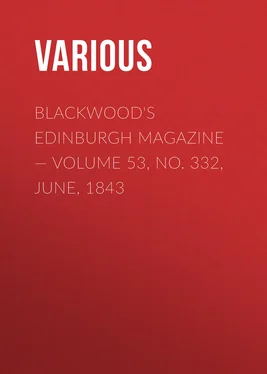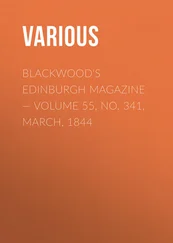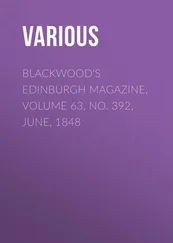Various - Blackwoods Edinburgh Magazine – Volume 53, No. 332, June, 1843
Здесь есть возможность читать онлайн «Various - Blackwoods Edinburgh Magazine – Volume 53, No. 332, June, 1843» — ознакомительный отрывок электронной книги совершенно бесплатно, а после прочтения отрывка купить полную версию. В некоторых случаях можно слушать аудио, скачать через торрент в формате fb2 и присутствует краткое содержание. Жанр: foreign_antique, periodic, foreign_edu, на английском языке. Описание произведения, (предисловие) а так же отзывы посетителей доступны на портале библиотеки ЛибКат.
- Название:Blackwoods Edinburgh Magazine – Volume 53, No. 332, June, 1843
- Автор:
- Жанр:
- Год:неизвестен
- ISBN:нет данных
- Рейтинг книги:4 / 5. Голосов: 1
-
Избранное:Добавить в избранное
- Отзывы:
-
Ваша оценка:
- 80
- 1
- 2
- 3
- 4
- 5
Blackwoods Edinburgh Magazine – Volume 53, No. 332, June, 1843: краткое содержание, описание и аннотация
Предлагаем к чтению аннотацию, описание, краткое содержание или предисловие (зависит от того, что написал сам автор книги «Blackwoods Edinburgh Magazine – Volume 53, No. 332, June, 1843»). Если вы не нашли необходимую информацию о книге — напишите в комментариях, мы постараемся отыскать её.
Blackwoods Edinburgh Magazine – Volume 53, No. 332, June, 1843 — читать онлайн ознакомительный отрывок
Ниже представлен текст книги, разбитый по страницам. Система сохранения места последней прочитанной страницы, позволяет с удобством читать онлайн бесплатно книгу «Blackwoods Edinburgh Magazine – Volume 53, No. 332, June, 1843», без необходимости каждый раз заново искать на чём Вы остановились. Поставьте закладку, и сможете в любой момент перейти на страницу, на которой закончили чтение.
Интервал:
Закладка:
As we were passing slowly through the plantations which encircled the Castle with all the noble and profuse shelter and ornament which our ancestors loved, a distant sound of music came on the wind. I then remembered, for the first time, that my brother had, on that evening, given a ball to the county, and a sudden sense of the difference of our lots in life, came painfully over me;—the course of secure wealth and English enjoyment, contrasted with the dependence and wandering which must form the existence of myself, and so many thousands of younger brothers.
I was awakened from my reverie by the voice of my companion. His face was upturned to the cloudless sky, and he was murmuring the fine passage in the Merchant of Venice.
"Look, how the floor of heaven
Is thick inlaid with patines of bright gold;
There's not the smallest orb which thou behold'st,
But in his motion like an angel sings,
Still quiring to the young-eyed cherubins:
Such harmony is in immortal souls."
"Do you know, Charles," said he, "what changed the whole current of my life? what, in fact, brought me back to England?" and there was a slight pause. "What made me a Christian? It was such a night as this. As you now know the chief part of my story, I need have no further concealment on the subject. I had recovered from my wounds, and was preparing to set out for Vienna, when one night a tempest blew down our tents, and left us to trust to the open air for the hours till morning. Tempests in the south are violent, but they are generally brief, and this gale cleared the sky of every cloud. As I lay on the ground, and gazed on the unusual splendour of the stars, the thought occurred to me, Why should doubts of a future state ever come into the mind of man? Why should he hesitate about its reality? Was it not there, before his eyes? Were not the very regions of future existence already within the reach of one of his senses? Why might they not yet be within the reach of all? Of course I do not give you all the vague thoughts which passed through my mind; but the permanence, power, and astonishing multitude of those bright worlds, impressed themselves on me with a new force. I had known all those matters before, but on this night I felt them. My next thoughts were of the power, the wisdom, and the majesty of the mighty Being by whom all this had been formed, moved, and sustained through thousands of years. I need not follow the history of my conversion—for a conversion it was. When I looked round me on the sleeping troops, I saw nothing but clods of the valley—gallant beings, but as insensible to their high inheritance as the chargers they rode. My heart moved me towards them; and perhaps, in some instances, I succeeded in giving them my own ideas. But Austria defies, at least, all human change. I was not a fanatic, and I had no wish to strive with impossibilities. I sent in my resignation; abandoned the 'pride, pomp, and circumstance' of the most tempting of all human pursuits, and returned to England to be, what you see me now."
With this man I could have no reserves, and I freely asked his advice on the plunge which I was about to make into that fathomless tide of good and ill, the world. I mentioned the Church as the profession which my mother had suggested, but for which I did not conceive either my temper or my habits suitable.
"You are right, then, in abandoning the idea altogether," was the answer; "and yet I know no profession more capable of fulfilling all the objects of a vigorous mind. I am not now talking of mitres; they can fall to but few. I speak of the prospects which it opens to all; the power of exerting the largest influence for the highest purposes; the possession of fame without its emptiness, and the indulgence of knowledge without its vanity; energy turned to the most practical and lofty uses of man; and the full feast of an ambition superior to the tinsel of the world, and alike pure in its motives, and immeasurable in its rewards."
"And, yet," said I, naming one or two of our clerical slumberers, "the profession seems not to be a very disturbing one."
"Those men, was the answer, would have been slumberers at the bar, in senates, or in the field. I may be prejudiced in favour of the choice which I made so long since, and which I have never found reason to repent. But I have not the slightest wish to prejudice any one in its favour. There is no profession which more requires a peculiar mind; contentment, with whatever consciousness of being overlooked; patience, with whatever hopelessness of success; labour, for its own sake; and learning, with few to share, few to admire, and fewer still to understand."
"If my father had lived," said I, "it was his intention to have tried my chance in diplomacy."
"Probably enough; for he had figured in that line himself. I remember him secretary of embassy at Vienna. Perhaps you will scarcely believe, that I, too, have had my experience on the subject? Accident once made me an attaché to our envoy at Naples. The life is an easy one. Idleness was never more perfectly reduced to a system, than among the half dozen functionaries to whom the interests of the British empire were entrusted in the capital of the Lazzaroni. As the Frenchman said of the Academy, 'We had nothing to do, and we did it.'"
"Italy," said I, "is the land of pleasure, and the Lazzaroni are its philosophers, but one cannot sleep like them in the face of day, and all day long. Let what will come, I have no desire to be a weed on the shore."
"No; we had our occupations; for we had the attendance on the court days—a business of as much formality, as if the fate of mankind depended on it. Then we had the attendance on the opera at night, a matter nearly as tiresome. The post from England reached Naples but once a-week, and scarcely once a month conveyed any intelligence that was worth the postage. But, if politics were out of the question, we had negotiation in abundance; for we carried on the whole diplomacy of the opera-house in London, engaged primo tenores , and settled the rival claims of prima donnas ; gave our critical opinions on the merits of dancers worthy of appearing before the British cognoscenti ; and dispatched poets, ballet-masters, and scene-painters, to our managers, with an activity worthy of the purest patriotism. What think you of the bar?"
"I have no head for its study; and no heart for its employment."
"It leads more rapidly to rank than any other profession under the sun; profit beyond counting, and a peerage. Those are no bad things."
"Both capital, if one could be secure of them. But they take too much time for me. I never was born to sit on the woolsack. No; if I were to follow my own inclination, I should be a soldier."
I have already said that I have been, throughout life, a kind of believer in omens. I have seen such a multitude of things decided by some curious coincidence, some passing occurrence, some of those odd trifles for which it is impossible to account, but which occur at the instant when the mind is wavering on the balance; that I feel no wonder at the old superstitions of guessing our destiny from the shooting of a star, or the flight of birds. While we were rambling onward, discussing the merits and demerits of the profession of arms, we heard the winding of the mail-guard's horn. I sprang the fence, and waited in the road to enquire the last news from the metropolis. It was momentous—the Revolution had effectually broken out. Paris was in an uproar. The king's guards had taken up arms for the people. The Bastile was stormed!
If I had hesitated before, this news decided me; not that I pretend to have even dreamed of the tremendous changes which were to be produced in the world by that convulsion. But it struck me as the beginning of a time, when the lazy quietude of years was about to be broken up, and room made for all who were inclined to exert themselves. Before we had reached the level lawns and trim parterres which showed us the lights of the family festivity, I had settled all the difficulties which might impede the career of less fortunate individuals; time and chance were managed with the adroitness of a projector; and if Bellona had been one of the Nine Muses, my speculations could not have been more poetical. Somewhat to my surprise, they received no check from my venerable tutor; quite the contrary. The singular sympathy with which he listened to my most daring and dashing conceptions, would have betrayed his early history if I had still the knowledge to acquire. His very looks, as he listened to my rodomontades, recurred to me, when I read, many years after, Scott's fine description of his soldier-monk in the Lay of the Last Minstrel:—
Читать дальшеИнтервал:
Закладка:
Похожие книги на «Blackwoods Edinburgh Magazine – Volume 53, No. 332, June, 1843»
Представляем Вашему вниманию похожие книги на «Blackwoods Edinburgh Magazine – Volume 53, No. 332, June, 1843» списком для выбора. Мы отобрали схожую по названию и смыслу литературу в надежде предоставить читателям больше вариантов отыскать новые, интересные, ещё непрочитанные произведения.
Обсуждение, отзывы о книге «Blackwoods Edinburgh Magazine – Volume 53, No. 332, June, 1843» и просто собственные мнения читателей. Оставьте ваши комментарии, напишите, что Вы думаете о произведении, его смысле или главных героях. Укажите что конкретно понравилось, а что нет, и почему Вы так считаете.












